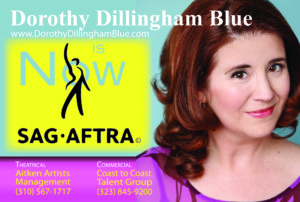
Labor Day



Many actors hold a misconception that pilot season is only for those who have top representation or who are series regular material. (Whatever that means.) There’s this idea that booking a pilot is better than any other acting job. People move cross country every winter, spending a year’s savings on a three month gamble.
It’s time to demystify pilot season. Companies use the tantalizing prospect of booking a pilot as bait to sell their product. Look, either you need new headshots, classes, an agent or not. Ask yourself, What do I need to support my career right now?
 She decided it was her time to do TV and film, and joining SAG-AFTRA was what she needed.The moment she made that decision – and I mean within a month – she got her first TV audition. Her musical comedy experience was an easy transfer to sitcoms. Offices began to call her in repeatedly, and six months later she booked a pilot.
She decided it was her time to do TV and film, and joining SAG-AFTRA was what she needed.The moment she made that decision – and I mean within a month – she got her first TV audition. Her musical comedy experience was an easy transfer to sitcoms. Offices began to call her in repeatedly, and six months later she booked a pilot. Joy walked her headshot into a casting office, because she knew she was perfect for a new show. Today she’s filming that show as the series lead! The series, however, never had a pilot. The network simply greenlit the entire season – a perfect example of how pilots are not the be all end all.
Joy walked her headshot into a casting office, because she knew she was perfect for a new show. Today she’s filming that show as the series lead! The series, however, never had a pilot. The network simply greenlit the entire season – a perfect example of how pilots are not the be all end all.Booking a pilot as a co-star or guest star can be just like any other acting gig. Yes, it’s fun to be on the ground floor of something new – something that could be the nation’s next big hit – but at the end of the day, it’s just solid work. So if your goal is to book solid work, then forget about the term, “pilot season”, collect what you need, and do what you need to do – now. If you can’t figure out what that is, then ask yourself, What do I really want? Your answer will guide yo
So I’ve been re-listening to the philosopher, Alan Watts, talk about the concept of turning work into play, and this always excites me. He lays out examples of how tasks that are usually approached with a sense of dread and suffering, can instead be approached with a sense of playfulness and freedom. He illustrates the difference between work and play. The former must have a purpose/outcome, and the latter is done simply for joy (weeeee!). Our culture teaches us not only to separate one from the other, but to prioritize work over play. Watts suggests we blur the lines between the two.
So how do we do that? Take anything that we “have to” do. That’s what we call work. First notice how anticipating it makes us feel (yuck), and let it go. Let. It. Go. That dreadful feeling is entirely unnecessary, and just creates stress. Now, as we begin the actual work, the game is to focus only on that tiny bit we’re doing right now. Yes, this is Zen. This is being present: One moment at a time, with no self-critique and no urgency. IMPORTANT – the minute the mind wanders into thoughts of deadlines and judgment, we lose our sense of play.
That being said, I must mention there are immediate results to this. I can point to two amazing things that come out of play: 1.) Work becomes stress-free, and 2.) Magically, there is time for everything. I’m not kidding. I could try to convince you of these benefits but that would just be too much work.
Dowton’s Abbey’s Lady Grantham’s character was best summed up in her remark at the dinner table when she asked, “What . . . is a ‘weekend’?” Their dinner guest was a doctor – someone who actually worked for a living – and he confused the Dowager with this term. While it made me laugh, I have been asking myself that same question all of my adult life. From the time I was in college I worked on the weekends to support my acting career. I envied “normal” people who brought home regular paychecks with enough left over to enjoy the weekend, which often included having brunch, where someone like me would serve them. I save my weekdays and weeknights for auditions and rehearsals. And of course, when I was in a show – I worked the weekends.
While it made me laugh, I have been asking myself that same question all of my adult life. From the time I was in college I worked on the weekends to support my acting career. I envied “normal” people who brought home regular paychecks with enough left over to enjoy the weekend, which often included having brunch, where someone like me would serve them. I save my weekdays and weeknights for auditions and rehearsals. And of course, when I was in a show – I worked the weekends.
After awhile, I began to see that I was living a privileged life, not a deprived one. I could do all of my errands without having to beat a crowd. I could see a matinee on a Tuesday afternoon. I could enjoy a good book and coffee while the rest of the world was “working”. While this non-traditional life never offered me a retirement plan, I also never planned to retire. I took trips when I wanted, played when I wanted, and had the luxury of living day to day because there was no company ladder to climb or boss to please.
I could enjoy a good book and coffee while the rest of the world was “working”. While this non-traditional life never offered me a retirement plan, I also never planned to retire. I took trips when I wanted, played when I wanted, and had the luxury of living day to day because there was no company ladder to climb or boss to please.
I still work the weekends, and I continue to work everyday for my career and my business. What I love most about it, is that my rest and enjoyment isn’t restricted to just Saturdays, Sundays and holidays. Yes, I have chosen a smaller paycheck in this life, but as every artist knows, freedom and creating art is the paycheck.